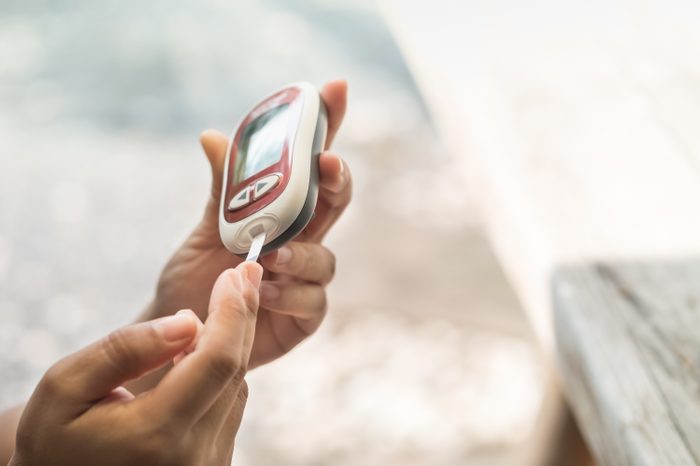Losing your keys doesn’t equal Alzheimer’s disease
Just because you walked into a room and can’t remember why, it doesn’t mean your mind is going. Other reasons for memory loss run the gamut from untreated depression to infections and medication side effects. Although it’s always a good idea to check with a doctor if you have continued forgetfulness and other cognitive problems, don’t assume the worst. “There are reversible causes of memory loss,” says Alan Manevitz, MD, a clinical psychiatrist with Lenox Hill Hospital in New York City. Here are some to look for.
Over 40? Here Are 9 Clever Memory Exercises to Start Doing Today

1. Depression
Forgetfulness along with problems concentrating, feelings of sadness and lack of focus are common signs of depression as well as Alzheimer’s. But the relationship between the two is a tricky one, says Marcela Kitaigorodsky, PsyD, a clinical neuropsychologist at the Center for Cognitive Neuroscience & Aging at the University of Miami Health System. “Depression is one of the symptoms of Alzheimer’s so it’s very difficult to tease out,” she explains. Only a doctor can tell for sure if you have one or the other or both, but getting treated for depression should help alleviate memory problems.
Feeling Depressed? Change This One Common Habit, Says New Study

2. Urinary tract infections
In older adults, urinary tract infections (UTIs) are a common cause of memory loss—along with confusion and even hallucinations, says Kitaigorodsky. Symptoms usually arise suddenly, according to the Alzheimer’s Society. A simple urine test can determine if you have a bacterial infection and if so, it’s important to get treated with antibiotics. “UTIs in elderly people can be life-threatening,” says Dr. Manevitz. In younger people, symptoms of UTI include pain when you urinate, needing to urinate often, and urine that carries an odor.

3. Normal-pressure hydrocephalus
Normal pressure hydrocephalus or NPH is when spinal fluid builds up in the brain. “The cerebrospinal fluid is not being cleared and it creates a change of pressure in the brain,” says Kitaigorodsky. Symptoms develop rapidly and include problems walking or urinating, confusion, and disorientation. Often no one knows what causes NPH, but it can result from a head injury, bleeding in the brain, a brain tumor or infection, says the National Institute of Neurological Disorders and Stroke. NPH is treated by inserting a shunt that drains out the fluid.
This Woman’s “Dementia” Turned Out to Be a Treatable Brain Condition

4. Lyme disease
Although fatigue is a more recognizable symptom of Lyme disease, a tick-borne infection, it can also cause memory problems along with slowed down thinking and trouble finding the right word, sometimes referred to as “brain fog.” These issues can turn up soon after the bite or even years later, according to Dr. Manevitz. If you know you’ve been bitten by a tick, have a doctor do a test to assess whether you’ve contracted Lyme disease or another tick-borne condition. He or she will then prescribe antibiotics or another treatment.

5. Subdural hematomas
Subdural hematomas are when certain blood vessels in the brain break, often as the result of a head injury, says the Mayo Clinic. The bleeding can build up and lead to dementia-like symptoms such as apathy, behavior changes and confusion, says Dr. Manevitz. Symptoms can turn up right after the injury or weeks or months later. Milder cases may go away on their own, says Dr. Manevitz. But these injuries can also be fatal. Concussions, also usually the result of head trauma, can also cause memory loss, according to the American Association of Neurological Surgeons.

6. Underactive thyroid gland
Also called hypothyroidism, this is when the thyroid gland doesn’t produce enough of the thyroid hormone, which you need for proper metabolism and many other functions in the body “It can affect memory, learning and short-term memory,” says Kitaigorodsky. What causes thyroid problems to begin with? Often an autoimmune disease, according to the Mayo Clinic, although there are other reasons as well. Once a diagnosis has been made, hormone replacement therapy is often used as treatment. Less often, an overactive thyroid can cause memory issues, says Dr. Manevitz.
Do You Have an Under-active Thyroid? This 90-Second Quiz Helps You Find Out

7. A vitamin deficiency
Especially vitamin B12. “Vitamin B deficiency can mimic Alzheimer’s disease and it’s very common for older adults not to have optimal levels,” says Kitaigorodsky. Once the deficiency is treated, the condition should right itself, she adds. Vegetarians and vegans sometimes have vitamin B12 deficiencies as the nutrient is found mostly in animal foods, says Dr. Manevitz. Good dietary sources include meat, fish, poultry, dairy products (milk, yogurt, cheese) and eggs as well as fortified grains and cereals, says the Academy of Nutrition and Dietetics.
8 Supplements and Vitamins for Memory—What Works and What Doesn’t

8. Diabetes
You can suffer both acute and chronic memory problems with diabetes. “It’s very insidious because you’re not getting the right balance of insulin and blood sugar,” says Dr. Manevitz. “If blood sugar levels drop too low, the body doesn’t have enough fuel to work on. You get hypoglycemic, become clumsy and on an acute basis it can look like you’re demented.” Over time if you’re not controlling your diabetes adequately, he adds, “there can be damage to all of the arteries in the brain.” And that can result in memory issues. Keeping your blood sugar levels even may help protect you against memory loss, according to the University of Southern California.

9. Problems sleeping
Not enough sleep or not enough good sleep can cause memory problems, as anyone who has tried to function after only three hours of Zzzz’s probably knows. “There is research pointing out that lack of sleep and poor sleep can affect memory,” says Kitaigorodsky. Obstructive sleep apnea may be a particular risk. This is when you actually stop breathing multiple times during the night. Using a continuous positive airway pressure (CPAP) mask, a common and effective treatment, can help give you a good night’s sleep.
These 4 Sleep Behaviors Can Help You Live Longer, Says New Research

10. A brain tumor
Depending on whether they’re located, brain tumors can affect memory as well as reasoning, thinking and other cognitive abilities. And even though no one wants to hear they have a brain tumor, the diagnosis isn’t always as scary as you think. About 30% of brain tumors are meningiomas, benign tumors that can sometimes be treated successfully without surgery, according to Johns Hopkins Medicine. And many people recover well from other types of brain tumors, both benign and malignant, especially if they’re caught early.

11. Overusing or abusing alcohol
Certainly, someone who drinks too much (and too quickly) in one session can have a total memory black-out. Some people experience memory loss after only a few drinks, according to the National Institute on Alcohol Abuse and Alcoholism. Imbibing too much alcohol over time can cause more chronic memory problems, says Dr. Manevitz. The good news is that laying off for a year or so will help you recover your abilities, he adds. One study found that a healthy lifestyle that included not drinking more than one glass of wine a day could protect against Alzheimer’s.
Drinking This Much Alcohol a Week Can Negatively Affect Your Brain

12. Medication side effects
Many different drugs including opiates, sleeping pills, certain antidepressants, and even antihistamines like Benadryl can cause forgetfulness and confusion. Elderly people are particularly at risk, says Joshua Niznik, PhD, assistant professor of medicine in the division of geriatric medicine at the University of North Carolina School of Medicine in Chapel Hill. That’s because they tend to take more medications and because their bodies don’t clear the medications as easily, he explains. But younger people can be vulnerable as well, especially if they’re taking more than one medication. Generally, mental issues from medications come on suddenly, says Dr. Niznik and can fluctuate quickly. Coming off the medication should resolve the problem but you should never do this without consulting your doctor.

